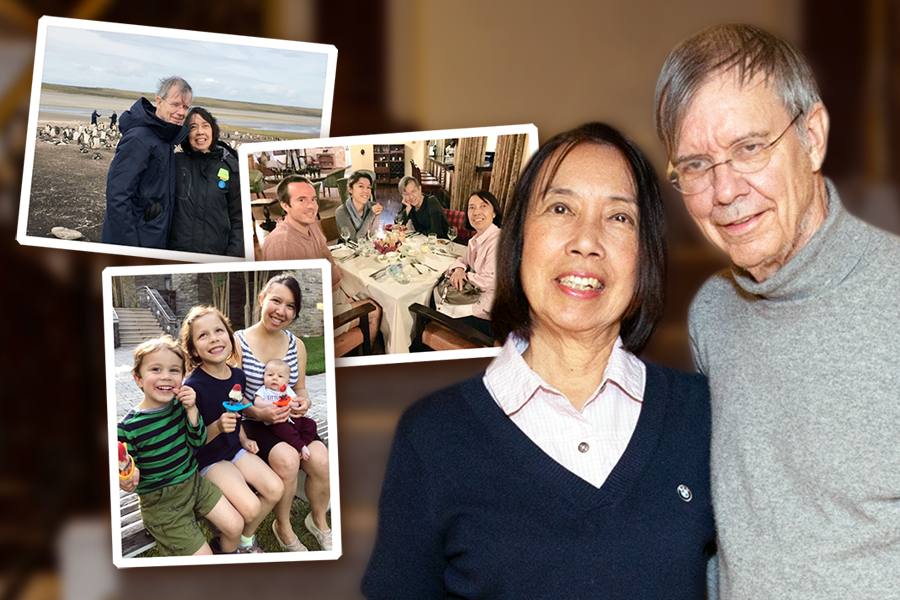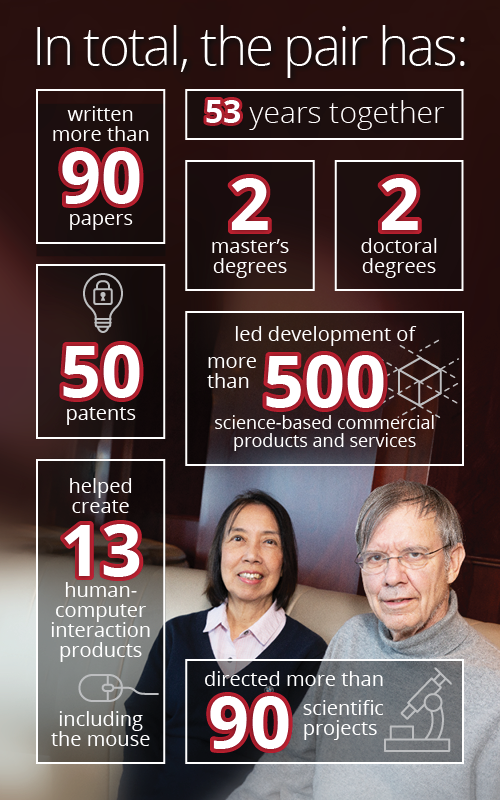
Leading with Heart
Josefina and Stuart Card began their story at CMU, and together, they’re making an impact for fellow Tartans
By Amanda S.F. Hartle
Josefina (TPR 1969, 1971) and Stuart Card (TPR 1970, DC 1978) started their five-decades-long romance sitting back-to-back in study carrels. Now, they’re showing their shared love of CMU by paying it forward with support for future generations of Tartans.
“We started dating my first week in the United States,” Josefina says. “We’ve been together ever since.”
In their 53 years together, they’ve made human-computer interaction history, started a successful social sciences R&D firm, raised two daughters and left a legacy for CMU students — and it all started in the then Graduate School of Industrial Administration’s student offices.
“Our whole story is really very CMU,” Stuart jokes.
"Follow your heart, your interests and the elements you want to celebrate. For us, it is just much more meaningful when there is a direct line between your own history, story, interests and passions, and the area to which you give."
Josefina Card (TPR 1969, 1971)
Groundbreaking Lives
After completing her undergraduate degree in the Philippines, Josefina beat out 5,000 other students for a Fulbright Scholarship and chose CMU over seven other prestigious U.S. universities to pursue her master’s and doctoral degrees in psychology.
“I really liked the technological and quantitative method that CMU offered, and I felt I could apply that approach to anywhere I went,” she says.
For Stuart, all he needed to head to CMU for his graduate and doctoral studies was a single lecture by computer science and artificial intelligence pioneer Herb Simon at Oberlin College where he was directing the campus’ computer center.
“I talked to him afterward about cognitive science and artificial intelligence. Then, I applied for CMU, packed my bags and left everything else behind,” Stuart says.
Once on campus, computer science and cognitive psychology pioneer Allen Newell told Stuart that the systems and communication sciences program he’d intended to pursue had been eliminated. So, Stuart invented his own interdisciplinary program combining psychology, artificial intelligence and computer science coursework — arguably the first Ph.D. in human-computer interaction.
Eventually, the couple settled in California’s Bay Area, the only place their many job offers had in common.
Stuart formed the Applied Information-Processing Psychology Project at Xerox PARC with Newell and Tom Moran, and together, the trio wrote the first book to use human-computer interaction in its title “The Psychology of Human-Computer Interaction.” He later founded the User Interface Research group and pursued new forms of human-computer interaction, eventually leading to Xerox’s commercial introduction of the mouse among a dozen other products.
Josefina spent a decade at The American Institutes for Research before founding Sociometrics in 1984, for which she still serves as CEO and president. With funding and cooperation from the National Institutes of Health and the National Science Foundation, the company translates findings from the latest behavioral and social sciences research into products that improve health outcomes and health care delivery.
In total, the pair has written more than 90 papers, holds 50 patents, directed more than 90 scientific projects and led development of more than 500 science-based commercial products and services.
Josefina and Stuart point to their time at Carnegie Mellon as being instrumental to all they accomplished in their careers.
“We wanted to express our gratitude for the exemplary education that we got at CMU,” Josefina says.
"I thought the space would be a beautiful example of how students from various departments and schools can come together and study together. It is a nice reflection on the work and the field to which I've been dedicated."
Josefina Card (TPR 1969, 1971)
Celebrating Their Story
The Cards’ giving reflects their shared love of Carnegie Mellon, the story of their days on campus and the successful careers made possible by their CMU educations.
“Follow your heart, your interests and the elements you want to celebrate,” Josefina says. “For us, it is just much more meaningful when there is a direct line between your own history, story, interests and passions, and the area to which you give.”
For Stuart, they created the Stuart K. Card Fellowship to support doctoral students in the Human-Computer Interaction Institute, whose work has a focus on the real-world applications Stuart pioneered throughout his career.
For Josefina, they created The Card Family Space in the Gates Center for Computer Science.
“Sociometrics is very multi-disciplinary,” she says. “I thought the space would be a beautiful example of how students from various departments and schools can come together and study together. It is a nice reflection on the work and the field to which I've been dedicated.”
Together, they served as lead donors to launch the Centennial Fund for the psychology department in the Dietrich College of Humanities and Social Sciences in honor of the university’s 100th anniversary.
The fund provides resources to help recruit and support graduate students and has been vital during the migration to remote learning and instruction prompted by COVID-19, says Michael J. Tarr, Kavčić-Moura Professor of Cognitive and Brain Science and head of Dietrich College’s Department of Psychology.
“Support from the Centennial Fund allowed every Ph.D. student in our program to readily obtain critical tools for remote work such as unique equipment for remote data collection, high-quality video conferencing infrastructure and monitors to use with laptops from home,” says Tarr. “The Centennial Fund has had broad impact and reinforced the ‘we are all in this together’ spirit that characterizes CMU’s community.”
